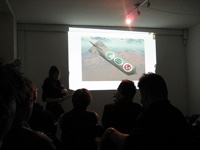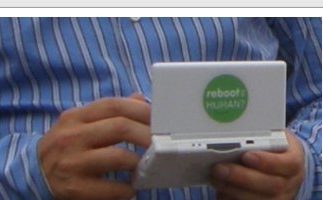 As it might have caught your attention, the second BarCampCopenhagen took place this Friday (25th of January 2008), and there was great energy in the building. It’s evident that there’s a strong interest in having an event like BarCamp in Copenhagen, and it was inspiring, just to try to tap into that energy.
As it might have caught your attention, the second BarCampCopenhagen took place this Friday (25th of January 2008), and there was great energy in the building. It’s evident that there’s a strong interest in having an event like BarCamp in Copenhagen, and it was inspiring, just to try to tap into that energy.
On the practical level, BarCamp was a great success, especially thanks to generousity of Beaconware (Troels, Allan and Kimmy) and of course Toothless Tiger (Henriette and Thomas) and Laura who moderated the “Kangaroo?” sessions, and thanks to the sponsorship from BridgeIT (my employeer), the event could be taken to such a high level, without having to charge the participants.
I must say that I’m amazed by the group of dedicated and interesting people that showed up, this is what they do for a living, but they’re also interested in sharing their ideas openly – thank you all!
To me the greatest moments were that I, finally, got to meet some people, that I’ve been following online, in real life.
If you have to criticise the event a little, I think we had some “growing pains” – in 2006 the event was more intimate, since we could all fit around one table, this meant that we could have more of an “open space” type of event, and that is the format that I prefer.
Civilisation 0.1
I did a presentation – Civilisation 0.1 – a pun on Tor Nørretranders Civilsation 2.0 – and I had some (understatement) difficulty making my points, that most likely had something to do with the fact that I had the wrong audience, since they’re all “believers”. Knowing the audience is, I believe, number one on the list of things to remember when doing a presentation of any kind, so that was sobering.
Since I failed to get my points across, talking about Pyramids, Archs and Fountains, I’ll try to do better here.
My presentation was inspired by this famous quote from Alan Kay:
If you look at software today, through the lens of the history of engineering, it’s certainly engineering of a sort—but it’s the kind of engineering that people without the concept of the arch did. Most software today is very much like an Egyptian pyramid with millions of bricks piled on top of each other, with no structural integrity, but just done by brute force and thousands of slaves.
My argument is that we’ve, so far, been building pyramids, but that we’ve invented the arch.
“The Pyramid”, is current ICT businesses, and their monopolistic pratices
“The Arch”, is “open source” and MM(O)C (Massively, Multiuser (Online) Collaboration)
“The Aqueducts” is the “Internet”
“The fountains” and “Temples” are the “things” we can build using “the arch” and the tremendously powerful tools and technologies we have in our hands.
I also tried to make these points:
- Basic infrastructure should be free
- We’re busy building “Pyramids” – using brute force
- Civilisation is still in beta
- We actually have the power to change things – get involved
- The beer isn’t free – it will cost money
- Join the revolution
Like I said, and this was obvious if you attended, I wasn’t too good at getting these points through, and to me, one of the main ideas of BarCamp, is to throw ideas on the table, even half baked ones, and have them tested, and even shot down.
My ideas was mostly shot down, and I got a “Emperor’s new clothes” type of comment: “To build the aquaeducts that feeds the fountains you already need an arch”, and someone else pointed out, that “something” was missing going from “The Pyramid” to “The Arch”, did it just appear out of the blue? I didn’t really answer that too well, my point is that the technological equivalent of “The Arch” has been/is being invented, now we can go build the aquaeducts and fountains armed with that knowledge.
Christian Schade was the most sceptical, I need people like him to question my ideas, so thank you Christian.
I’ve actually done a lot of thinking about this, basically I’m a strong believer in utopian ideas – they’ re getting a bit old, and others are better at getting them across than me.
I enjoyed the discussion we had afterwards, and I think that I managed to sell some of my ideas. It’s really quite simple, don’t wait for the revolution to happen, get involved. Like I said, this was the wrong audience, since they’re all already involved in the revolution.
My presentation did align itself, almost perfectly, with the two that followed, those of Christian Schade and Tania Ellis.
The Digital Divide
I was very pleased to, finally, meet Christian Schade, a person that I’ve been following for some time. I’ve never met him before, and I only knew him because he, sometime ago, added me as a contact on the online service Jaiku. The way he’s using a microblogging service is very similar to the way I use it, he often posts short messages that only he can understand – like a song that he had some sort of association to.
Christian talked about “the digital divide”, and he started out by stating that the difference between the things he was going to talk about, and the things I talked about, was similar to “the glass is half-full” (me)/”the glass is half empty” (Christian). You could say that I’m the optimist and Christian is the realist.
Christian got his points through, and they’re quite sobering. It’s possible that the younger generation is tech-savy, but they’re basically IT illiterate, yes they know how to use their cellphone, but the Nokia N95 they’re carrying around really is an extremely powerful computer, that they’re just using to TEXT each other.
Since the current trend is that businesses, and the public, use more and more advanced electronic solutions – yes: e-mail qualifies as advanced – IT skills are increasingly important, skills that the educational system isn’t focusing on.
So the digital divide is getting bigger, even in developed countries, and no one seems to care, like Christian pointed out, no one has really seriously looked at the problem with the digital divide, since the Dybkjær report, and when that was issued, they weren’t even sure if the Internet should be the backbone of the “Digital Denmark”.
Of course part of the problem with technology has to do with accessibility, and the general computer really is too complicated to be the basic tool of the digital revolution – no-one should have to know what a firewall and an anti-virus program is…We have a great challenge ahead of us, but no-one seems to care.
I later had a long discussion with Christian, and that was great.
Capitalism with a human face
 BarCamp was also graced by Tania Ellis, author of the book “De nye pionerer” (The New Pioneers), and her presentation was about “Social business” – new alliances (oops ;-)) between economics and humanism.
BarCamp was also graced by Tania Ellis, author of the book “De nye pionerer” (The New Pioneers), and her presentation was about “Social business” – new alliances (oops ;-)) between economics and humanism.
Tania started out by showing a picture of the two choices of careers you’ve had since the 70ies, either you’re the poor, “peace and love” hippie or the greedy business man, but could a third way be emerging? A way where you can merge and/or mix the two, achieving balance and the best of two worlds.
Tania has been giving this a lot of thought, and the examples she found were ranging from the relatively well known (Life Straw), to the “interesting” (Solar Powered Vibrators) to the self-contradictory (Environmentally friendly munitions).
After Christian’s venture into dystopia, Tania presented hope for the future, maybe that is an attribute of the feminine? Afterwards she said that having children certainly helps, something that Christian tried to protest ;-).
I think that Tania managed to put words to my ideas, and present them is a structured manner – the “exercise” of writing a book is probably helpful ;-). Seen as a whole, the pre-dinner presentations by Christian, Tania and me fit extremely well together.
BTW, the splash screen on Tania’s web-site is a quote from Alan Kay. It used to be part of the name of my PowerBook, until I discovered that iTunes Music Store doesn’t like long computer-names, strangely enough the fact that I’ve written about the solution, is the biggest driver of traffic to my blog!
del.icio.us
After these three Kangaroo? tracks, it was time for dinner, and that was just del.icio.us (sorry or soz as I’ve begun to say recently).
Ruby don’t take your love to town
After the break, I decided to stay truer to my Geek roots, and attended the session “Ruby, Rails <meta>?” by Casper Fabricius. This was a great introduction to Ruby. Ruby is definitely very cool – like Neo cool – and I do love interpreted languages. I got a flash-back to the strangest language I’ve ever worked with, APL – an interpreted language that I have mainly used on an IBM mainframe.
One thing I find interesting is the trench-digging, and categorisation of people based on what programming languages they use – with the possible exception of Perl, I haven’t seen a programming language I couldn’t master with relative ease, and I’m, of the conviction that you need to have some general awareness of the different languages and tools that you have at your disposal. If Ruby can get the job done, quicker and faster, you should be allowed to use it.
Unfortunately Denmark is Microsoft country extraordinaire, and .NET is way too dominant. I totally agree with Casper that Reflection in C# is very hard to grasp, within this field Ruby is pure simplicity, and it is just beautiful.
As with all interpreted languages, there are justified performance fears, but if you can deliver solutions quicker, the benefits might overshadow those concerns.
Casper asked the question: so what can you use all this Neo-coolness for? He didn’t really have the time to answer this, but Ruby is being used to build world-class applications.
If you want to get started with Ruby, Casper pitched the web-based Ruby development environment Heroku, and it looks like a good place to start venturing into Ruby coolness. Heroku is in closed beta, but you might be allowed to pass through the Pearly Gates to Ruby coolness, by contacting Casper. [Casper has made me aware (see comments) that Heroku is for Ruby on Rails development, it’s important to distinguish between the two].
Quo-vadis?
The most surprising presentation of the evening, was the presentation by Henrik Biering of the work NETAMIA has done to develop a single-sign-on (SSO) engine, called net-safe. Net-safe is a standards based, plug-able SSO infrastructure, that also contains address validation etc. Running a successful on-line business depends on correct identification of the users, and having valid user data, also means that the users are better behaved.
Henrik knew what he was talking about, based on the experiences of the huge user base of heste-nettet.dk, which he runs. I guess it is obvious, but it really was an eye-opener to me, correct/valid information of users is extremely important, if you want to run a serious web-site.
Everyone in the room was blown away by seeing how polished a product Net-safe is, and when asked how much it had cost to develop it, Henrik answered: hmm, it was something I did together with my son…Amazing!
Embracing the chaos
Henriette talked about how to get businesses to embrace the chaos of the net, it’s a topic she’s writing a book about, and I look very much forward to it.
Engaging the geek warp drive
After all these sessions, I really needed a break, but when Michael Widerkrantz aka. MC, started rearranging the chairs, I just knew that I had to attend.
MC talked about IPv6, and why it’s important. In case you don’t know, IP is the basic communications protocol of the Internet, and the version we’re currently using, has a build-in limit of the number of allowed network addresses, that we’re about to hit, MC said that a recent session of RIPE, estimated that it would happen in less than two years.
I know just a little about networks, but this was mostly over my head, basically I’m sitting somewhere above layer 7, and just want the network to, ahem work, so it beats me why the ISPs just don’t get started rebuilding the infrastructure for IPv6, before it’s too late.
An interesting side-note is that a friend of mine just recently returned from South Africa, and I found out, because her computer acted strangely, that it was because she had been using IPv6 – as seems to be common with developing countries, South Africa is skipping the legacy infrastructure completely, a legacy that will soon hit us, and the entire digital economy, which today is synonymous with the economy.
Thank you
That concluded the official program of BarCamp Copenhagen, and what a great night it was, the air was literally buzzing with energy. Events like this are important, and I hope that this will get people talking and taking similar initiatives.
 March the 24th 2009 is Ada Lovelace Day, the brainchild of Suw Charman-Anderson. Suw pledged to write a blog-post about a woman in tech that she admired, if at least 1,000 would make the same pledge, and since I’ve admired and been fascinated by Ada Lovelace since childhood, and especially after I read the wonderful book The Difference Engine, so I embraced the project, but at the same time I knew that it would be difficult for me to find just a woman in tech that I admire, that is because the list is long, and I’m happy to say that it’s actually getting longer.
March the 24th 2009 is Ada Lovelace Day, the brainchild of Suw Charman-Anderson. Suw pledged to write a blog-post about a woman in tech that she admired, if at least 1,000 would make the same pledge, and since I’ve admired and been fascinated by Ada Lovelace since childhood, and especially after I read the wonderful book The Difference Engine, so I embraced the project, but at the same time I knew that it would be difficult for me to find just a woman in tech that I admire, that is because the list is long, and I’m happy to say that it’s actually getting longer.












